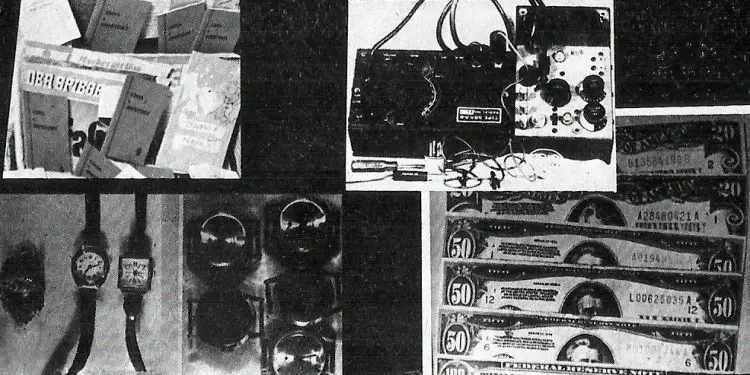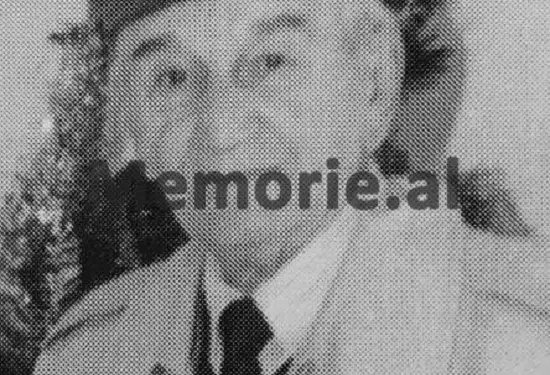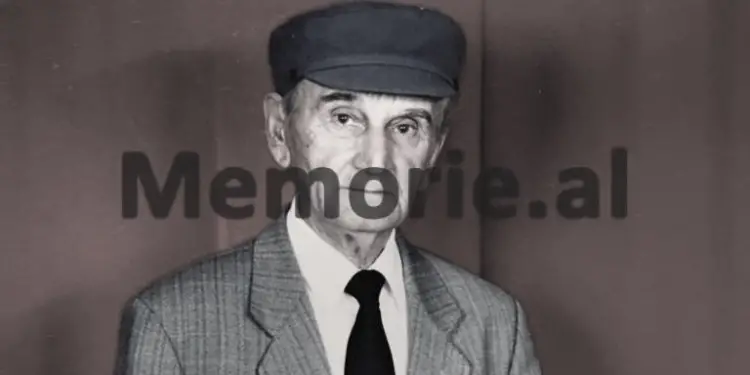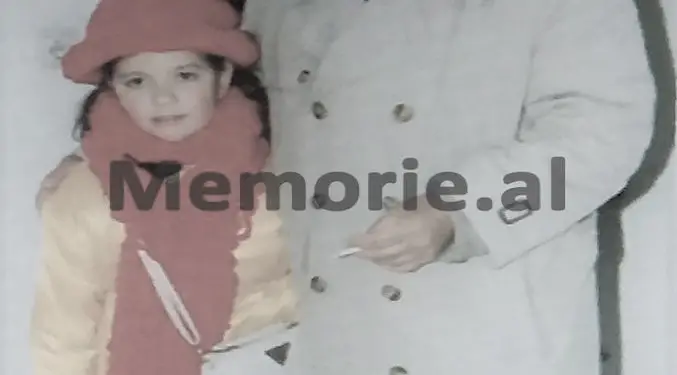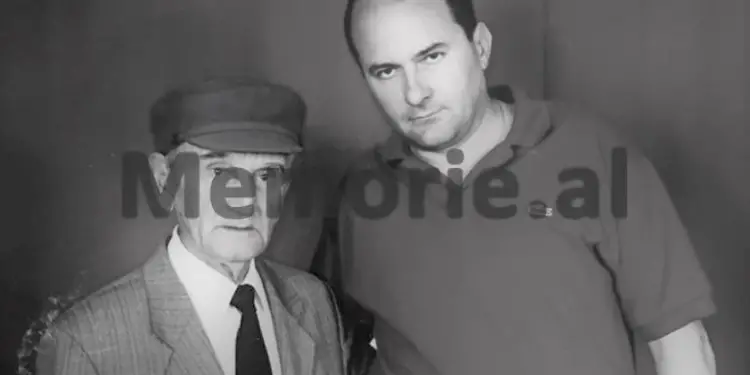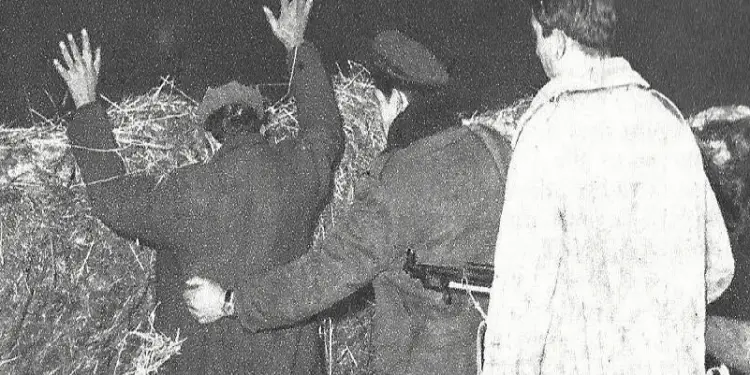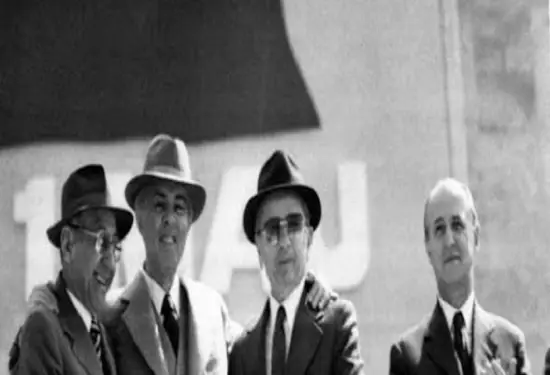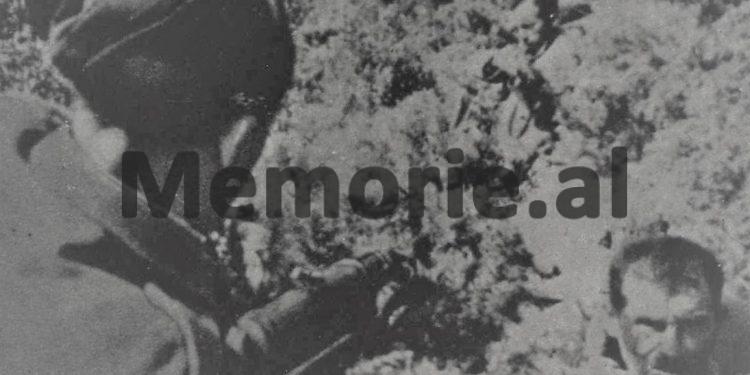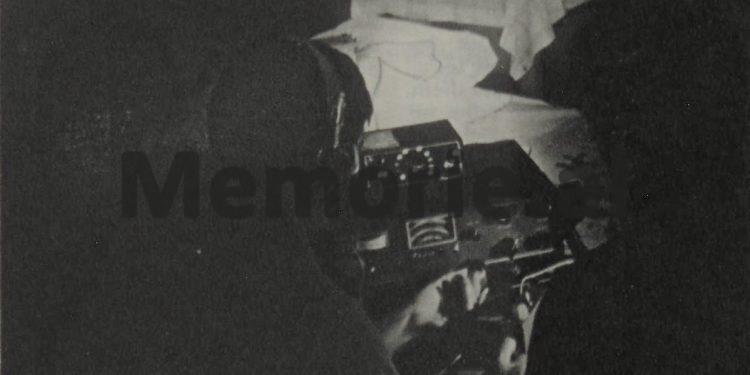Dashnor Kaloçi
The third part
Memorie.al publishes the unknown and rare story of Avdul Hakan Banushi from the village of Golem in Gjirokastra, who during the occupation of the country (1939-1944), unlike his entire family who joined the forces partisan, he joined the nationalist youth organization “Balli Kombëtar” in the city of Durrës, where he was arrested by German forces in October 1943 and together with 73 other people, were initially sent to the German camp in Prishtina, and then to the mass extermination camps at Landesberger and Dakau, from where he could only be released in 1945, after the intervention of Anglo-American forces. Banushi returned to Albania in 1945, after staying for some time in the Reggio-Emilia camp in Italy, (where at that time were also some of the main leaders of ‘Balli’ and ‘Legality’ led by Mit’hat Frashëri and Abaz Kupin) and his arrest a few days after arriving home, after at Lapraka airport, partisan guards found a letter given to him by the former Prefect of Gjirokastra, Rasim Babameto, while they were in Reggio-Emila. Banush was sentenced to 18 years in prison, accused of being an “agent of the Anglo-Americans” and released in 1961, where he did not spend much time with his family in the village of Golem, after being arrested again while interned in the town of Fier, from where he managed to escape from prison the first night and fled in the direction of Gjirokastra, where he crossed the state border and went to Greece, where he soon gained political asylum in the United States. Banushi’s engagement in the ranks of the Albanian political diaspora in the West, as a member of the “Free Albania Committee”, where in 1973, after being trained by the CIA, he came several times with secret missions to Albania, in order to carry out assassinations Enver Hoxha in the big parade of November 29, 1974, on the occasion of the 30th anniversary of the liberation and his arrest in 1975 near the border of Hani i Hotit, after a trap set by the Minister of Internal Affairs, Kadri Hazbiu , from where he would then be isolated for two years in the cells of ‘Ward 313’ in Tirana Prison and then in Burrel, from where he could only be released in early 1991.
“When the first contradictions of official Tirana with the People’s Republic of China started in 1972-’73, we became even more confident that the time had come to organize concrete measures for a possible landing in Albania. After talks between the leaders of the “Free Albania” Committee and Mr. Joseph Shisko, Deputy Secretary of State, and Major Thomas Smith, who covered Albanian political emigration to the United States, in January 1974, the presidency of The organization “Albanian Anti-Communist Resistance Front” decided to send to Albania the first group, which would consist of five people. Among the main tasks that the group would perform were: ‘Meetings with people dissatisfied with the communist regime, the demolition of the Stalin and Lenin monument in the center of Tirana, the blowing up of the headquarters of the Central Committee of the ALP, the distribution of anti-communist propaganda materials, which had been prepared in New York, etc. It was decided that the first group would be led by me, as I was acquainted with the contingent of families persecuted by the communist regime, where we would initially rely. In addition to me, this group also included: I. Rrushiti, N. Banushi, I. Lame and A. Sula. After some intensive preparations we made on a secret basis, we finally set off on the plane that would traverse the route: New York – London, – Amsterdam – Rome – Athens. When we arrived in the Greek capital, we took refuge in the Hotel “Atlantik” and the next day we went to the military base of Preveza, where the colonel who was waiting for us supplied us with weapons consisting of five automatic weapons, five pistols, 20 grenades, 6 kg dynamite, capsules and mechanical devices for their detonation, swimwear, a radio transceiver, as well as many other ammunition and equipment. After arranging these in a safe place, I talked to the colonel about the possible routes we had to follow to enter Albania and at seven o’clock in the evening we set off in a small speedboat run by three sailors and after a few hours we arrived in the coast of Ksamil ”.
This is how Avdul Hakan Banushi, originally from Golem of Gjirokastra, remembered the beginning of the “Albanian adventure”, who told us for the first time some of the most sensational events of his life, which took place in 1974 – ’75, when he, at the head of a commando group launched by the United States of America, entered Albania several times with secret missions.
Who was Avdul Banushi and what is his past? Why was he interned in the Nazi concentration camp in Dakao, Germany, and how did he manage to escape? How did he return to Albania in October 1945 and why was he sentenced to 18 years in prison, being accused of being an agent of the Anglo-Americans? How did he manage to escape from the Fier Branch of Internal Affairs in the first days of August 1961 and how did he cross the border into Greece? What was asked of him in Athens and how did he gain political asylum in the United States? Who were the Albanian anti-communist leaders who organized the “Throne of Anti-Communist Resistance” and why did the “Albanian adventure” of Abdyl Banushi and the assassination of Enver Hoxha in the big parade of the 30th anniversary of liberation on November 29, 1974 fail? Who was the man who accompanied and betrayed Abdyll Banushi on his last mission in Albania, which caused him to fall alive into the hands of the Albanian border forces near Hani i Hotit, from where he would be isolated in the horrific Burrell prison, until the fall of the communist regime in 1991? Regarding these and many other events and facts, we know the exclusive interview given to us by Mr. Banushi, a few years ago, which will be in six numbers in a row.
Following from the next issue
Mr. Banushi, what did you do after the failure of the action for the assassination of Enver Hoxha and the planting of bombs in the Chinese embassy?
When we saw that it was impossible for us to carry out our two actions, in order not to further complicate the situation, before the parade was over, we left from there and returned to our base at the Bineri family in the “Shallvare” Palaces. There our guard we had left to check the base from State Security surveillance, told us that many civilians occasionally crossed the street in front of that palace and watched from the house where the two Bineri families lived. We held a brief meeting where we decided to change the base, as there were all possibilities that we had fallen into the trail of Security. After that, we got out of there unnoticed and on foot went to the other base in the Begeja family, where the owner of the house was very frightened by the movements of the Security people. We did not stay there long and immediately left for the village of Ndroq, at our base in the Mancaku family. It was one of our safest bases, because Envetr Hoxha’s communist regime had shot two sons, Seit and Zydi Mancaku, in that family. We stayed there for seven days in a cattle hut, without going outside at all.
Where did you go from?
Seeing the very complicated situation, we left there and went to Fier where we took refuge in the Margaritari family which welcomed us quite well. In Fier I also met my old friend Haxhi Moskin and two or three others I had had in Burrel prison. They gave us a more detailed description of the situation by telling us about the numerous checks that the State Security had undertaken throughout the country, on the occasion of the November holidays. From Fier we went to Izvor of Dukati, where after entering about the center by radio, the underwater vehicle came and picked us up. When we arrived in Preveza, we handed over the weapons and took the plane and left for the USA, where we reported on all our mission, which had failed us.
After this mission, did your organization “Resistance Front” undertake other actions or actions to drop bombs on Albanian embassies in the West?
We could no longer carry out such missile-bombing missions, etc., for the fact that we had received the last warning from Major Thomas Smith.
But what were the actions to be carried out by the “Resistance Front” and did the State Security know that you had planted the bombs in Rome and Paris?
The actions to be taken by the five groups that had been formed after the decision of the “Anti-Communist Resistance Front” had the sole aim of entering Albania, while in terms of State Security, it had followed in our footsteps through the agents it had recruited in Albania and had brought them to us in the US Also, the State Security was fully aware that I had planted the bombs in the embassies of Rome and Paris.
How did the State Security find out that you were the person who planted the bombs in the Albanian embassies in Rome and Paris?
The person who informed the State Security in Tirana that I had planted the bombs in the Albanian embassies in Rome and Paris was called Ndoc K. and was from Shkodra. Ndoci was an adventurer, working in a company somewhere on the outskirts of Shkodra and it was said that at that time, he was engaged to the granddaughter of one of the Secretaries of the Central Committee. He came from a family that had been severely persecuted by Enver Hoxha’s communist regime, and this was exploited by the State Security officers, who immediately recruited him. After recruiting him, the State Security played a game, saying that he had escaped, while he had escorted him to Montenegro and within three days he arrived in Italy. In Rome he presented himself to Ernest Koliqi, telling him that he had fled Albania and asked him for help to find him a job. Koliqi, after keeping him at home for three days, expelled him because he had received information from Gjon Gjinaj, who had told him that Ndoc K. was an agent of the Albanian State Security and that he had come there on a special mission.
Where did you learn all this?
All these conversations were told to me by Ndoc K. himself when he came to the US, but he did not admit that he was a State Security agent.
But why did Ndoc K. come to the US and how did you get in touch with him?
Ndoc K. came to the US because one of the main missions assigned to him by the State Security was to gather information about the group that had dropped bombs on the embassies of Rome and Paris. Ndoc K., after being expelled by Ernest Koliqi, was able to obtain the right of political asylum in the USA, through Mrs. Sofie K. who worked in the American immigration offices based in Rome. Sofia played a double game, working for both the Americans and the Albanian State Security, because she had her persecuted relative in a village in Lushnja. Thus, according to the order of the State Security, she granted Ndoci political asylum in the USA. When he came to the United States, Ndoci immediately went to the Albanian Mission to the UN, where he got in touch with Sokrat Çomon, who was the man of the State Security and was disguised as a diplomat at that Mission. Ndoci gave him the slogan he had received from the Security in Albania and Socrates gave him the tasks he had to perform there. The first thing Socrates did to Ndoci was introduce himself to another Albanian named Loro Shpori, and they were both tasked with finding out: who were the ones who planted the bombs in the Albanian embassies in Rome and Paris.
Who was Loro Shpori and was he known as Ndoc K.?
Loro Shpori was from a village in Shkodra and had been in prison as a political prisoner. When he was released from prison he had escaped from Albania and had come to the USA. With Loro Shpori I had been friends since before we started our actions and then he had sniffed that I was making numerous air travels across Europe. Loro introduced me to Ndoc K. and at that time Ndoci sewed badly on me, ostensibly as a close friend and came to my house. At that time, Loron had met Sokrat Çomo and had recruited him to work for the Albanian State Security, charging him with the tasks he had to perform. As a reward for this, Socrates had promised him some privileges to send money and packages to his people in Albania, as much as he wanted and without customs.
How did you know that and what were the tasks assigned to Loro Shpori?
All this was told to me by Loro Shpori himself and the mission assigned to him was: to monitor the four Albanian cafes located on Allen Street in New York, Cafe “Tirana”, “Çajupi”, “Ali Pasha Tepelena” and “Rozafa”. Loro Shpori also told me about Ndoc K. who was a State Security agent. After Loro told us about the agreement he had made with Sokrat Çomon, we told him to do his homework, but before sending the information to the Albanian UN Mission, he had to bring it to us.
Did Loro Shpori do this and why did you continue to associate with Ndoc K. when you knew he was a Security agent?
Loro agreed to do what we told him and those of the UN Mission, sending them irrelevant information, literally playing a double game. At first we did not know Ndoc K., we were having some suspicion, that he was out of work in the US. Whereas when we found out that he was a Security agent, we badly unmasked him throughout the Albanian diaspora and he remained a ‘burnt card’ in anti-communist emigration. Nevertheless he continued his work.
Besides Ndoc K and Loro Shpori were there any other State Security agents who were put in to track down your group?
At the time we had carried out the first actions under the leadership of the “Resistance Front”, the State Security undertook a major offensive to track us down and this was evident from the numerous agents it recruited and launched in the US. Except Loro Shporit and Ndoc K., at that time came to the US and a 26-year-old boy named Tom M. Toma was from Selca in Vermosh, Shkodra, and came from a family very much influenced by the communist regime of Enver Hoxha. It seems to me that his uncle was shot there in 1947 in the city of Korça, while his uncle was still in prison, as a political prisoner. Toma was interned on the island of Lezha, where Kadri Hazbiu often went hunting. .
Did Tom M. come to the US?
Immediately after the elaboration by the Minister of Internal Affairs, Kadri Hazbiu, Toma was escorted by the State Security to Italy, where through our embassy and Sofie K., he came to the USA. At the time the Security escorted Tom to Italy, he also escorted his brother Deda to Montenegro, who had also been recruited by the Security. To lose track of the State Security game with Toma and Deda, they spread the word that the two brothers M., had fled to Italy by boat from the village of Tale in Lezha. Toma arrived in the US with all his wife and young son, while his brother Deda, left in the border area of Montenegro with Albania, to investigate the bases of our groups that were created by Dr. Hamdi Uruçi. Shortly after arriving in the United States, where Thomas gave birth to a daughter, he went to the Albanian Mission to the UN and met with Socrates Çomon. Socrates associated Thomas with Ndoc K. and Thomas for about eight months, staying in the US, where he did not work at all and claimed to receive assistance.
How did you get in touch with Tom M?
After eight months, according to the instructions he had received from Kadri Hazbiu, Toma appeared at the offices of the “Free Albania” Committee and requested a meeting with its main leaders. They received Tom, who told them that he wanted to volunteer to go to Albania and fight against communism, because the communists had killed their father and persecuted all their relatives.
What was the response that Toma received from the leaders of the “Free Albania” Committee?
Member of the chairmanship of the Committee. Dr. Hamdi Uruçi asked Toma how he proved that the communists had killed his father and Toma replied that there were many of his fellow villagers in New York who could be asked about what he had said.
Was the chairmanship of the Committee interested in Thomas?
Yes, many people were asked about it and it turned out to be as Thomas said.
What happened next to Tom?
After Thomas’ words about his biography were confirmed, he volunteered to come with me on a mission to Albania, saying that he wanted to take revenge on the communists. I admitted that it never occurred to me that that young boy had been processed by the State Security. After that we took over the tasks around the mission we were going to carry out in Albania and on April 26, 1975 Toma and I boarded a plane in New York and arrived in Athens.
Did you go to Athens alone with Tom?
Yes, only with Toma and after three days, Nikola Plesati, who was from Korça and lived in Igoumenitsa, came to meet us in Athens.
Who was Nikola Plesati and why did he come to meet you?
Nikolla’s father (Thoma Plesati) had died in the prisons of communist Albania in 1953 and at that time he also had two brothers, Koço and Llambron, who were also in the prisons of the communist regime of Enver Hoxha. He would accompany us to Preveza, where he would talk to US Colonel Bill to supply us with weapons, because by order of Major Thomas Smith, we could no longer take up arms there.
Did Colonel Bill get in your way?
He did not put any obstacles in front of us and after the conversation that Nikola had with Bill, he supplied us with all the necessary weapons.
What did you do after you were supplied with weapons?
After that we made the plan how we would enter Albania. /Memorie.al
The next issue follows




